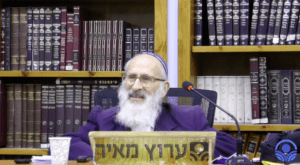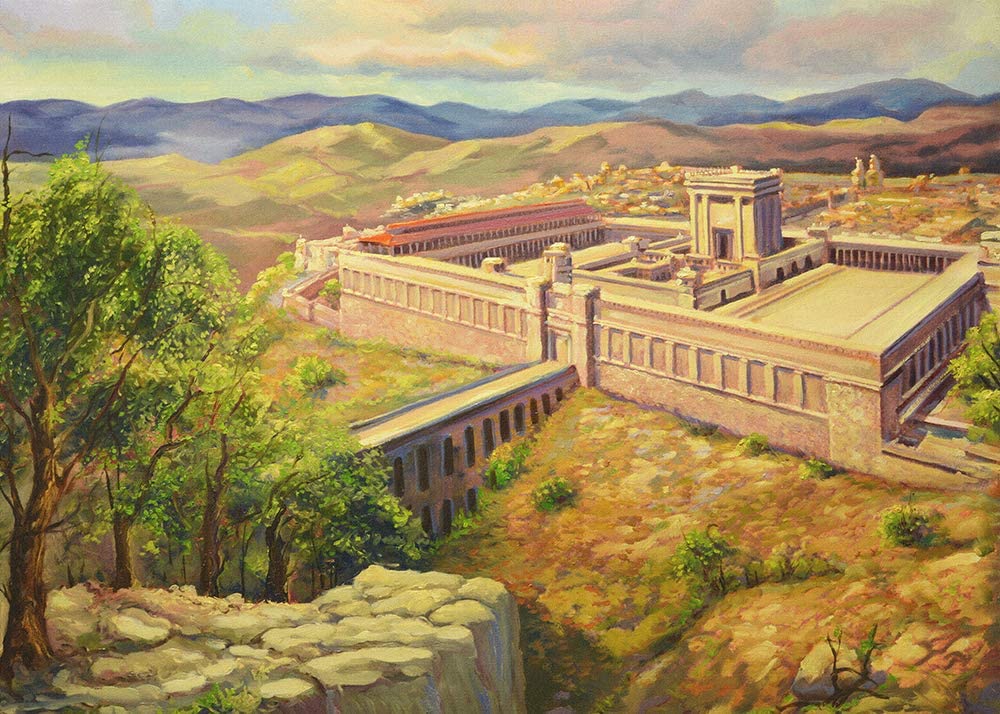Does God Cry over the Destruction?
by HaRav Shlomo Aviner, head of Yeshivat Ateret Yerushalaim

It says in Yirmiyahu, “My soul shall weep in secret (mistorim) for your pride.”²¹ The Talmud discusses this cryptic verse: R. Shmuel bar Onyo said in the name of Rav, “There is a place where God goes to cry, and its name is Mistorim.” And what does “for your pride” mean? R. Shmuel bar Yitzchak said, “This refers to the pride of Israel which has been taken away from them and transferred to the other nations.” But R. Shmuel bar Nachmani said, “This refers to the pride of the Kingdom of Heaven….”²² Here, the reaction to the destruction is presented as “crying.” The Master of the World cries over the lost pride of Am Yisrael. Our national pride and strength has been shattered and violated. We were once an independent, respected State. At times we behaved well, and at others, not so well, but we were always able to hold our heads upright. Now, after the destruction, we have lost our independence and are broken and persecuted in exile. God must certainly cry over that.²³
Thus, two reasons are given for God’s crying: He is weeping over the Kingdom of Heaven and over the Kingdom of Israel. These two reasons are really one, for the Kingdom of Heaven only manifests itself in this world through the Kingdom of Israel. They are one.²⁴ The Talmud asks: Can God really cry? The answer is: Outwardly, only strength and joy are evident, but inwardly, there is crying.²⁵ Similarly, even in exile, Am Yisrael rejoices over our communal life of Torah study and mitzvot, but inwardly we cry over our lost national pride. All the troubles and persecution we have suffered in the long years of exile came as a result of the destruction of the Beit HaMikdash and the Kingship. When the prophet Yirmiyahu describes the destruction in the last chapter of Melachim, he relates the fate suffered by King Tzidkiyahu, who was blinded after being forced to witness the slaughter of his sons, and then exiled to Babylonia. We know, though, that millions of Jews were murdered at the same time.²⁶ Why does Yirmiyahu depict only the king’s torment, without mentioning the other victims? Because the entire tragedy came about as a result of the loss of sovereignty. Likewise in our time, the Holocaust could only happen when there was no sovereign State of Israel. Our lamentations on the Seventeenth of Tammuz and the Ninth of Av over the destruction of the Beit HaMikdash and the exile is really a mourning of the cause of all subsequent calamities. There is, therefore, no need to set aside a separate day of mourning for the Holocaust.²⁷ Our Sages said: If the nations of the world only knew how good it would be for the whole world if the Beit HaMikdash were rebuilt in Jerusalem, they themselves would build it for us – of gold!²⁸ In the same vein, we may say, “If the world only knew what a blessing it is for an independent Jewish State to exist, they would build us a state of gold.” If they could recall all the justice and righteousness, all the ethical values and enlightenment bestowed upon the world by Am Yisrael in their own Land, and could understand that a return to our Land would introduce a new era for all mankind – they would lend us greater assistance and support.²⁹ But they do not understand this, so we must build the State by ourselves. This is the will of God. Nevertheless, there have been a few righteous gentiles, such as Orde Wingate, who did understand. Wingate wrote that he was helping the Jewish people establish their own state despite the fact that this was contrary to the current interests of his British homeland, because he felt that all humanity would benefit from a sovereign Jewish State.
The Seventeenth of Tammuz denotes not only the breach made in the physical walls of the city, but also the breach made in Heaven. Since then, our world has been gloomy, weak and shaken. This shattering of all existence worsened with the Destruction of the First and Second Temples on the Ninth of Av. Today, thank God, the situation is being remedied. An independent State has been established and Jerusalem is in the process of being rebuilt. Am Yisrael’s dignity is being restored. There is less hidden crying. At this point, it is irrelevant whether we have a monarchy or democracy, as long as we have our own sovereign State.³⁰ It may not be a perfect State, but it is certainly a completely different reality. We still cry inwardly over the Kingdom of Heaven that has not yet come, but we take comfort in the fact that we are only at the beginning stages. Eventually, the Kingdom of Israel will become the Kingdom of Heaven. We don’t know how long it will take – perhaps hundreds of years – but we do know that it will happen, and we pray that it will happen in our lifetime.






